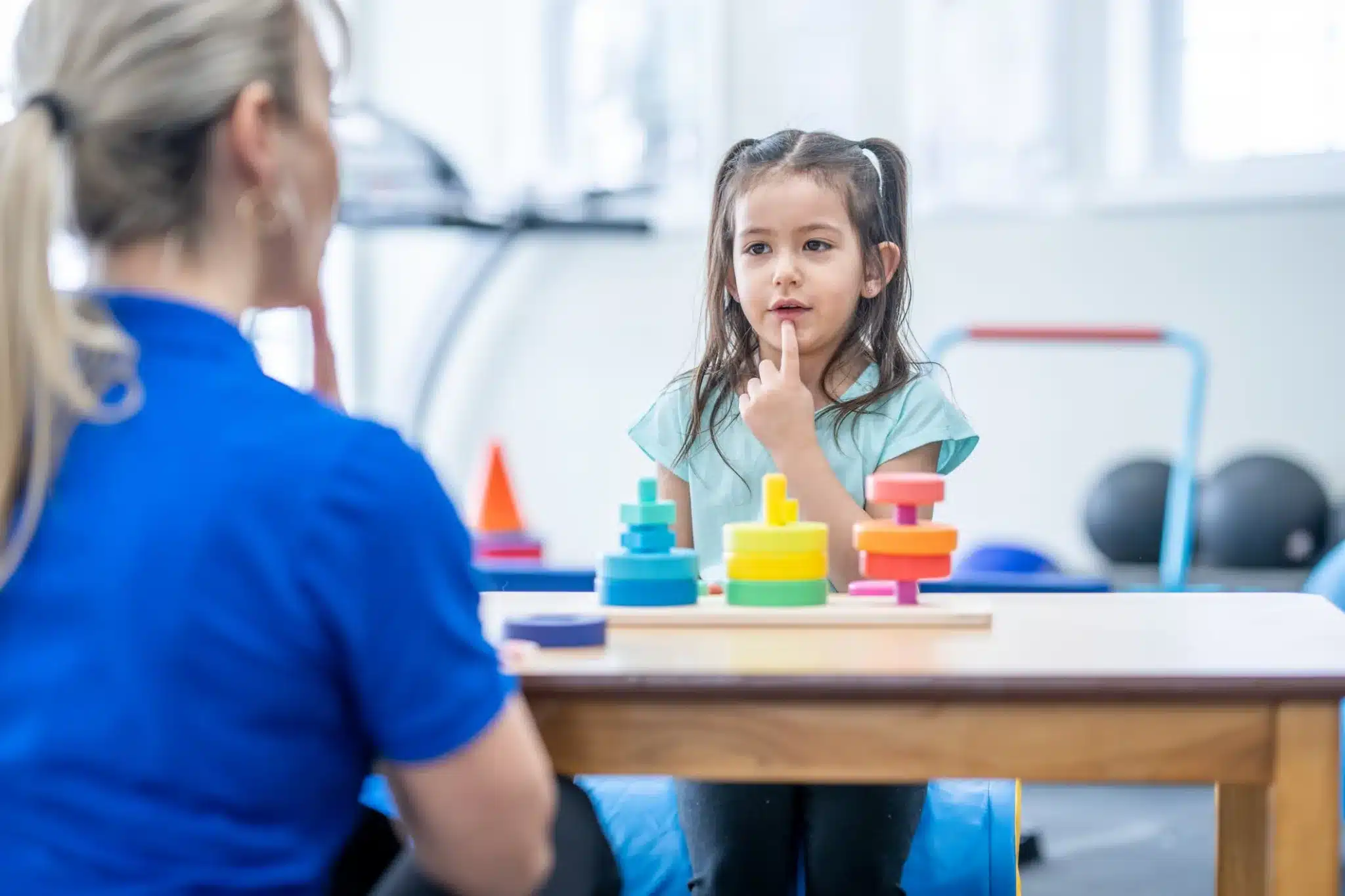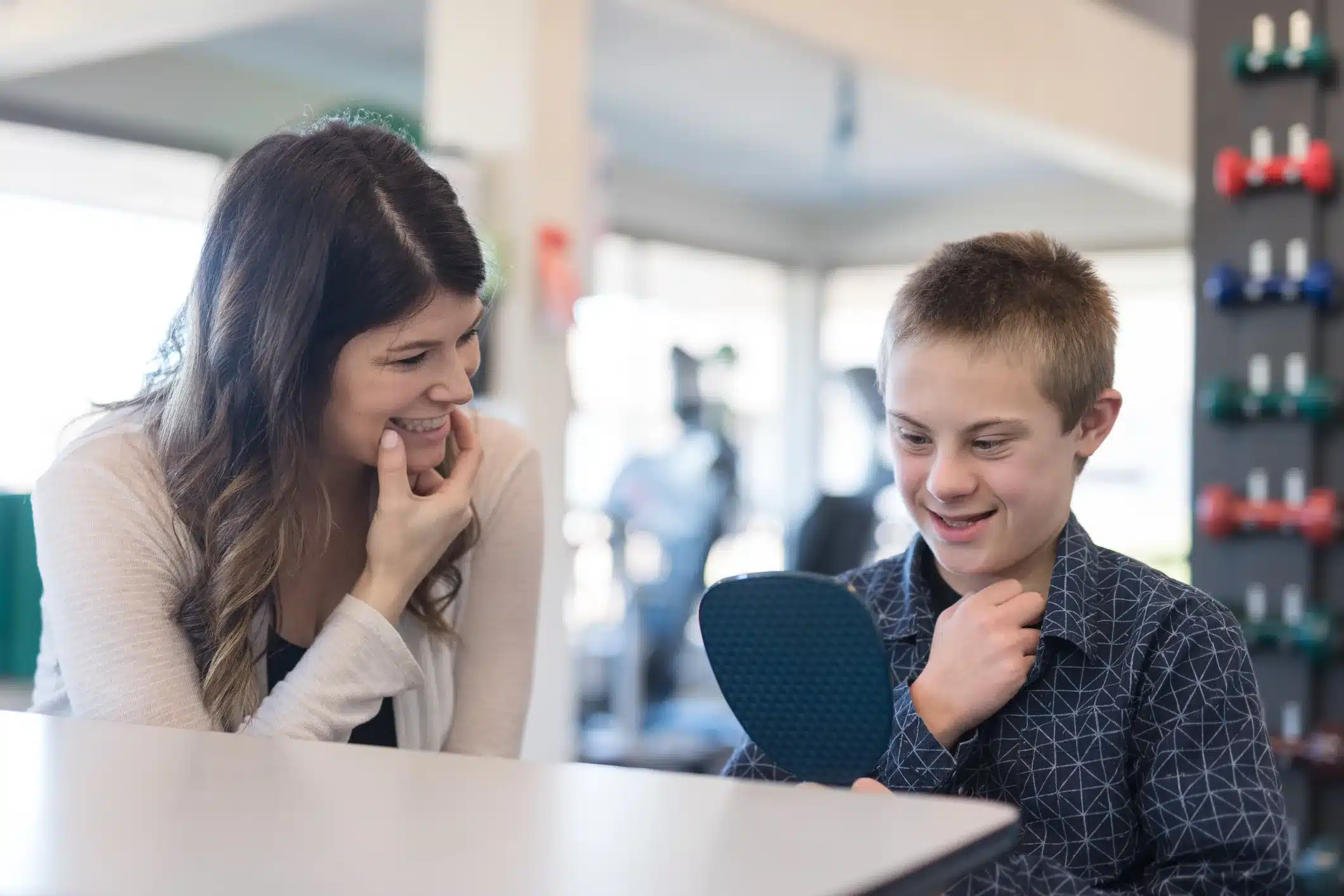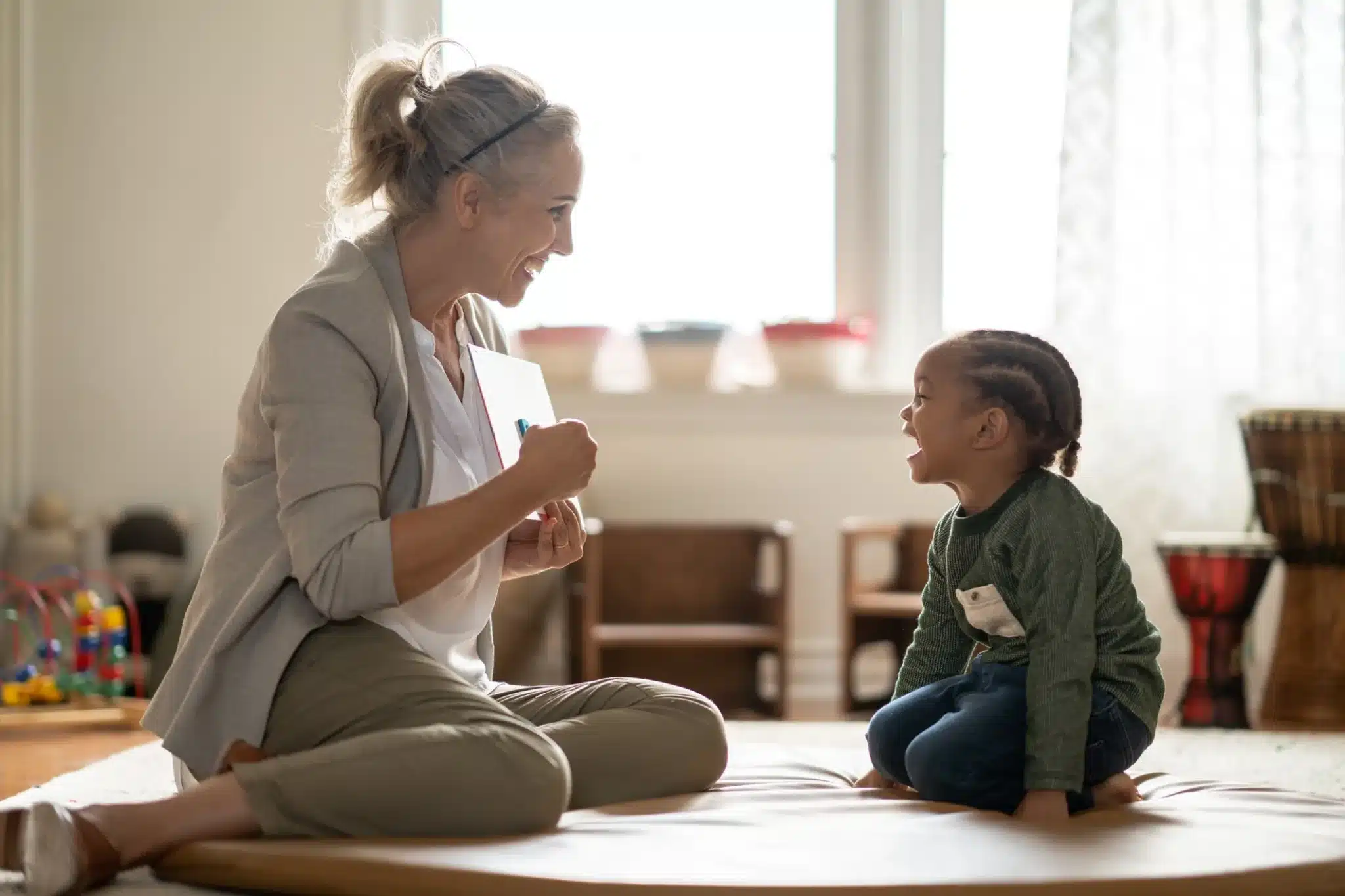Pediatric Speech-Language Therapy

If your child has trouble with their speech or language skills, our expert Speech-Language Pathologists can help them learn to communicate with ease. We use proven treatments and child-led sessions to ensure your child can improve their speech and language skills while having fun.
What Is Speech Therapy?
Pediatric speech therapy is a specialized treatment for children who struggle with their speech or language skills. Your child will work with a speech-language pathologist (SLP) on different activities and exercises that can help them improve their ability to speak clearly, share their ideas, understand others, and much more. And for children who are nonverbal or have a condition that limits their speech, our SLPs can teach them to use Augmentative and Alternative Communication (AAC) methods such as electronic devices or sign language to empower their ability to communicate.


What Are Speech Skills?
Your child’s speech skills enable them to pronounce words properly, speak without stuttering or pausing, and use their voice without strain. Children who have a speech delay may struggle with one or more of these areas. This can lead to trouble making friends and doing well in school, which is why early intervention is so important. Some common signs that could indicate a speech delay include:
- You can understand your child, but other people can’t
- Your older child speaks or translates for your youngest child
- Your child gets frustrated because they aren’t understood
- They stutter, pause between words, or take a long time to speak
- Their voice sounds raspy, nasally, breathy, too loud, or too quiet
What Are Language Skills?
- Have a hard time following directions
- Are behind their peers in reading or writing
- Struggle to phrase their ideas clearly
- Have trouble socializing with other children
- Leave out or substitute words in a sentence


What Are the Benefits of Speech Therapy?
- Improved self-confidence
- Refined pronunciation and fluency for clearer speech
- Stronger understanding of language
- Better ability to socialize with other children
- Improved academic performance
- Reduced stress, anxiety, or upset about communication
- Increased independence
- Improved ability to share ideas with AAC as needed
Pediatric Hearing Screenings
Your child’s ability to hear can impact their speech and language skills. That’s why our clinics in College Station, Montgomery and Huntsville, TX provide pediatric hearing screenings. We can determine if your child has any level of hearing loss or struggles with auditory processing, which means they can hear but have trouble understanding speech sounds.
Testimonials




Pediatric Speech-Language Therapy FAQs
How Can Pediatric Speech Therapy Improve My Child's Communication Skills?
Pediatric Speech Therapy at Believe Therapies can make a significant difference in your child’s ability to communicate easily and confidently. Through fun, engaging activities and proven techniques, our expert Speech-language pathologists (SLPs) can help your child improve their speech and language skills in ways that feel natural and enjoyable.
If your child struggles with forming clear sentences, expressing themselves, or understanding others, our therapists can help them overcome these challenges step by step.
For children who are nonverbal or may have limited speech abilities, the team at Believe Therapies can introduce Augmentative and Alternative Communication (AAC) methods, such as sign language or electronic communication devices. These tools can help empower your child to communicate in a way that works best for them, enhancing their ability to interact with others.
The earlier speech therapy begins, the better. Early intervention can help your child develop essential communication skills that will go on to support their social interactions, academic success, and overall confidence. With the support of our skilled therapists and a child-centered approach, your little one will be well on their way to improved communication skills and a brighter future!
What Specific Speech and Language Disorders Do Pediatric Speech Therapists Treat?
Our pediatric speech therapists can help children overcome a variety of speech and language disorders, improving their ability to communicate with ease.
Below are some common disorders our team at Believe Therapies treats:
- Speech Delays: If your child is not speaking as clearly or as quickly as their peers, our therapists can help them with their articulation and clarity.
- Articulation Disorders: Children with articulation disorders may struggle to pronounce some sounds correctly. Speech therapy helps them learn how to produce sounds and words comfortably and confidently.
- Stuttering: Speech therapy helps children who stutter by teaching techniques to improve the flow of speech and reduce anxiety.
- Language Delays or Disorders: Our therapists can help kids struggling with understanding or using language. We can help them build vocabulary, improve sentence structure, and assist in helping your child understand language rules for better communication.
- Social Communication Disorders: Some children may have difficulty with social cues or maintaining conversations. Our therapists can help them develop the skills needed to interact with peers and adults with confidence.
- Voice Disorders: If your child’s voice sounds raspy, breathy, or strained, our therapists can improve vocal quality and ensure safe voice use.
- Nonverbal Communication: Our therapists can coach children to use alternative communication methods, such as sign language or communication devices, to express themselves.
How Should I Explain Speech Therapy to My Child?
Explaining speech therapy to your child in a comfortable and positive way can help them feel confident and excited about the process.
You can start by telling them that speech therapy is a place where they’ll get to practice talking and listening in a fun way. For example, you might say, “We’re going to see a special teacher who’s going to help you learn new ways to talk and make it easier to say the words you want to say!”
Let them know the therapist is a friendly expert who will help them with fun games and activities. You could also say, “The therapist will play games with you to help you practice saying certain words more easily, and we’ll have lots of fun while we do it!” A statement like this can help take away any fear and make the idea of speech therapy sound like the fun and enjoyable experience that it is.
Reassure your child that it’s okay to make mistakes and everyone learns at their own pace. You might explain, “It’s just like learning how to play a new game—sometimes it takes time, and that’s okay!”
To help your child get excited about beginning their speech therapy journey, you can share that the goal is to help them express themselves and how they feel with ease. You could say, “Speech therapy is here to help you talk and share your thoughts more easily with friends and family, and when we’re done, you’ll be able to tell people what you’re thinking even more easily!”
What Techniques Are Commonly Used in Pediatric Speech Therapy Sessions?
Pediatric speech therapy sessions at Believe Therapies rely on a variety of fun and engaging techniques to help children improve their speech and language skills.
Here are some of the most common techniques our therapists utilize:
- Articulation Therapy: Our therapists may use games or activities to encourage practice with specific sounds, helping children speak more clearly.
- Language Stimulation: Our therapists encourage language development by using simple, fun activities that involve asking questions, telling stories, or expanding on the child’s words. This helps children build their vocabulary and understand sentence structure.
- Interactive Play: Our speech therapists often use play-based activities to keep children engaged while learning. Playing with toys, puzzles, or games can help reinforce new words and communication skills in a relaxed, enjoyable setting.
- Augmentative and Alternative Communication (AAC): For children who have difficulty speaking, our therapists may introduce communication devices or teach sign language as alternative ways to express themselves.
- Breathing and Voice Exercises: For children with voice disorders, our therapists may guide them through special exercises to help improve breath control and vocal quality, ensuring their voice is used safely and effectively.
How Does Pediatric Speech Therapy Support Children with Speech Delays?
Pediatric speech therapy is designed to help children with speech delays develop the skills they need to communicate effectively. If your child has a speech delay, their therapist will create a personalized plan that focuses on building their ability to speak clearly, use language, and express themselves confidently.
At Believe Therapies, one of the primary ways speech therapy supports children with delays is through targeted articulation exercises. These activities help children learn how to make the sounds needed for clear speech, whether they struggle with pronunciation or are unable to form certain words properly. Our therapists will guide your child through fun activities that make practice enjoyable and natural.
Language development is another key focus at Believe Therapies. Our speech therapists work with kids to expand their vocabulary, teach them how to form sentences, and help them understand how language works.
Our therapists also use play-based techniques, allowing kids to engage in activities they enjoy while building crucial communication skills. Whether it’s playing with toys, reading stories, or singing songs, these interactive approaches make speech therapy feel less like work and more like fun!
What Should I Expect During My Child's First Speech Therapy Session?
During your child’s first speech therapy session at Believe Therapies, your child’s therapist will focus on getting to know both you and your child, creating a comfortable and welcoming environment. Expect a friendly introduction where the therapist explains what speech therapy is and how it can help your little one.
The therapist will likely begin by asking you questions about your child’s speech and language development, including any specific concerns you may have. They might ask about milestones like when your child first started speaking, any difficulties they’ve had with certain sounds or words, and how they communicate with others. It’s a great time to share any observations or questions you may have about your child’s speech!
For your child, the first session will also likely involve some fun, interactive activities. The therapist might use toys, books, or games to engage your child and assess their communication skills. The goal of this first session is to make your child feel at ease while the therapist observes how they speak, understand language, and interact.
At the end of the session, the therapist will explain their observations and outline a plan for moving forward, including goals and strategies to help your child improve. The first session is a chance to build trust and set the stage for positive progress ahead!
Can Pediatric Speech Therapy Help with Social Communication Skills?
Yes! Pediatric speech therapy can be incredibly helpful in improving social communication skills for children.
Social communication involves not only the ability to talk but also understanding and using language in social situations. This includes taking turns in conversation, interpreting nonverbal cues like facial expressions or body language, and using appropriate greetings and responses.
At Believe Therapies, our speech therapists will work with your child to teach them how to engage in conversations, ask questions, and respond to others in ways that are socially appropriate. They may use role-playing games, storytelling, or interactive activities to help your child practice these skills in a fun and safe environment.
For children with difficulty understanding social cues, their therapist will help them learn how to read and respond to emotions in others, such as recognizing when someone is happy, sad, or upset. This can make social interactions less confusing and more enjoyable.
By improving these skills, speech therapy can help your child build stronger relationships with their peers, boost their self-confidence, and improve their overall social development. With consistent support, children can feel more comfortable and successful in social settings, whether at school, home, or with friends!
How Frequently Should My Child Attend Speech Therapy Sessions?
The frequency of speech therapy sessions for your child will depend on their individual needs, goals, and progress. Typically, children attend sessions once or twice a week at Believe Therapies to provide consistent practice and support.
For some children with more significant speech delays or specific challenges, more frequent sessions may be recommended. However, children who are making steady progress might transition to less frequent visits as they master skills.
When it comes to frequency, your child’s therapist will assess your child’s needs and work with you to establish a therapy schedule that works best for your family. This might include considering your child’s age, the severity of any speech difficulties, and how much practice they may need to make progress.
In addition to the regular therapy sessions, your therapist may suggest at-home exercises or activities to support your child’s progress between visits. These can help reinforce the skills learned during therapy and provide additional opportunities for growth!
Consistency is key when it comes to speech therapy. The more frequently your child engages with their therapist, the more they’ll benefit. Regular sessions also help ensure that your child stays on track with their communication goals, building confidence and skills for a successful future.
What Progress Can Be Expected from Pediatric Speech Therapy?
The progress your child can make through pediatric speech therapy at Believe Therapies depends on their individual needs, challenges, and goals.
Every child is different, and therapy is personalized to address specific areas where your child needs support, whether it’s improving speech clarity, expanding vocabulary, or enhancing social communication skills.
In the early stages of therapy, you might notice improvements in your child’s ability to pronounce words more clearly, use sentences more effectively, or better understand and follow directions. As therapy progresses, your child will continue building on these foundational skills, gradually becoming more confident in their ability to speak with and communicate with others.
With time, effort, and consistency—speech therapy at Believe Therapies can help your child thrive in school, at home, and with friends!
Are There Activities or Exercises to Support Speech Therapy At Home?
Absolutely! You can do many fun and easy activities at home to support your child’s speech therapy progress. The key is to make practice enjoyable and incorporate it into your child’s daily routine.
For younger children, reading together is a great way to support language development. Choosing books that engage your child’s interests and encouraging them to point out pictures, repeat words, or answer simple questions about the story helps with vocabulary building and understanding language in context.
For children working on articulation, try practicing sounds or words that your child finds challenging. Make it into a game by turning it into a song or a fun challenge! For example, making animal sounds or mimicking their favorite characters’ voices can help strengthen their speech muscles.
If your child is working to improve their social communication skills, you can try role-playing and practicing everyday conversations. You can practice greetings, asking for things politely, or taking turns in a conversation. Practicing these skills in a low-pressure, fun setting can make a big difference!
Be sure to communicate with your child’s therapist for additional exercises tailored to their needs. With a bit of creativity and consistency, home practice can be a big help in supporting your child’s progress!

Contact Us for More Information
Do you have any questions about our therapy services? Give us a call today at (936) 293-8800 or fill out the form below. Our staff will be happy to get you the answers you’re looking for.

